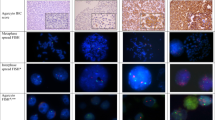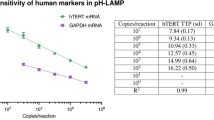Abstract
We have used polymerase chain reaction (PCR) to measure keratin 19 mRNA in order to detect breast cancer cells invading axillary lymph nodes. In a consecutive series of 125 patients with primary breast cancer, 75 patients had no evidence of lymph node involvement by conventional histology. A total of 530 lymph nodes from these patients were examined and 106 (20%) gave a keratin 19 product detectable by Southern hybridisation. This correlated with primary tumour size (P<0.001). These 106 nodes came from 23 patients. Thus, using this technique, 23/75 (30.6%) patients were found to have evidence of lymph node involvement who would otherwise have been designated lymph node negative.
This is a preview of subscription content, access via your institution
Access options
Subscribe to this journal
Receive 24 print issues and online access
$259.00 per year
only $10.79 per issue
Buy this article
- Purchase on Springer Link
- Instant access to full article PDF
Prices may be subject to local taxes which are calculated during checkout
Similar content being viewed by others
Author information
Authors and Affiliations
Rights and permissions
About this article
Cite this article
Schoenfeld, A., Luqmani, Y., Sinnett, H. et al. Keratin 19 mRNA measurement to detect micrometastases in lymph nodes in breast cancer patients. Br J Cancer 74, 1639–1642 (1996). https://doi.org/10.1038/bjc.1996.601
Issue Date:
DOI: https://doi.org/10.1038/bjc.1996.601
This article is cited by
-
The clinical significance of disseminated tumor cells in breast cancer
Nature Clinical Practice Oncology (2007)
-
Detection of disseminated lung cancer cells in regional lymph nodes by assay of CK19 reverse transcriptase polymerase chain reaction and its clinical significance
Journal of Cancer Research and Clinical Oncology (2005)
-
Breast cancer and the NSABP-B32 sentinel node trial
Breast Cancer (2004)
-
Analysis of potential markers for detection of submicroscopic lymph node metastases in breast cancer
British Journal of Cancer (1999)
-
Management of the axillary nodes
Breast Cancer (1999)



